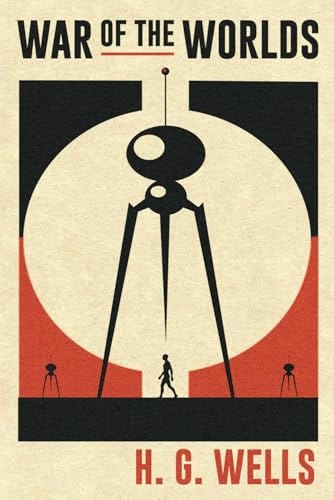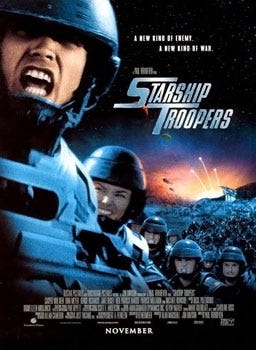It may seem strange to write about wars with aliens in SF when an actual war is happening in the Middle East. But isn’t it the duty of an intellectual to step aside from the froth of ever-changing politics and current events and to see things in a different way? And how better to do it than through the lens of SF? So hello, defamiliarization, my old friend!1
No other plot in SF is as popular as the alien invasion. Aliens invaded and conquered our planet by stealth (taking over human bodies and minds as in Jack Finney’s Invasion of Body Snatchers, 1953); brute force (smashing the military and colonizing and enslaving the population as in Carol Emshwiller’s The Mount, 2002); spreading propaganda through video games (as in Liu Cixin’s Three-Body Problem, 2015); modifying humanity out of existence (as in Garth Nix’s Shade’s Children, 2010); and even by destroying Earth completely (as in Greg Bear’s Forge of God, 1987). Each of these scenarios deserves its own essay. But here I want to ask a general question. Why do we keep having collective nightmares about arguably nonexistent aliens waging clearly impossible wars?
To answer this question, let’s take a look at the first and best of the alien-invasion stories, H. G. Wells’ The War of the Worlds (1897).
The novel is not as what numerous cinematic remakes would lead you to believe. It is sparse, grim, and unforgettable. Narrated by an unnamed first-person narrator caught in the confusion of a sudden attack, it is the one of the great novels of modern warfare, prophetic in its unsparing depictions of the carnage of military technology. It is hard to believe that its images of stampeding refugees, deserted London, and rising clouds of poison gas were put on paper 17 years before World War 1. The well-known episode of mass panic occasioned by the radio drama based on The War of the Worlds in 1938 is a testimony to Wells’ imaginative grasp of the experience of modern war. In H. Bruce Franklin's words, “the Martians, with their armored war machines, poison gas, flying machines and heat beams, are invaders not so much from the neighboring planet as from the approaching century” (2008: 65).
But it is reductive to see alien invasions merely as allegories of human wars. The Martians in Wells’ novel are enigmatic and incomprehensible. Since there is no communication whatsoever, their reasons for attacking Earth are never revealed. The narrator speculates a lot about them, conjecturing whether the invaders came in search of resources or food (as Martians seem to subsist on the blood of humanoid creatures from their own planet), but these are merely speculations. The one question that the narrator keeps asking himself and never finding an answer to, is:
“What are these Martians?”
The Martians remain an opaque and alluring mystery. They can be defeated, but they are never fully understood.
The same is true about all the best novels of alien invasion. The military plot of defense, resistance, or attack is counterbalanced by the epistemological plot of trying (and often failing) to understand the aliens. The military plot is structured by the opposition of good versus evil. The epistemological plot is structured by the opposition of known versus unknown. “Evil” and “unknown” are not synonymous. The first is a humanist concept. The second is not.
Brothers-in-Arms
The title of this essay is a quote from Chris Hedges’ book about his experience in the military:
“War makes the world understandable, a black and white tableau of them and us…We are one. Most of us willingly accept war as long as we can fold into a belief system that paints the ensuing suffering as necessary for a higher good, for human beings seek not only happiness but also meaning. And tragically war is sometimes the most powerful way in human society to achieve meaning” (10).
Later in the book he waxes nostalgic about the affection and solidarity among soldiers, recalling how the “selflessness of war mirrors that of love” (159). Brotherhood in arms creates "bonds of mutual dependency and sacrifice of self, stronger than any of the friendships made in peace and harmony" (Keegan 427). War can be seen as a source of meaning, as the rejuvenation of a decadent society, as the triumph of good over evil.
In order for war to be morally uplifting, it has to be a just war. There are legal frameworks for defining the moral character of a war, based on the Roman distinction between jus ad bellum (just cause for war) and jus in bello (just conduct in war). If both obtain, the war is not only justified but virtuous. As St. Augustine says in The City of God:
But, say they, the wise man will wage just wars. As if he would not all the rather lament the necessity of just wars, if he remembers that he is a man; for if they were not just he would not wage them, and would therefore be delivered from all wars (Book xix).
But isn’t war based on “dehumanizing” the enemy? No, just the opposite. War is predicated on fully understanding the enemy and ascribing to them the same motivations, albeit inverted, as “our side” has. War is the fullest expression of Theory of Mind. In classic theories of war, combat is described as a duel, in which the capacity of putting oneself in the shoes of the enemy is crucial. Karl von Clausewitz analyzes military escalation as understanding the enemy all too well, so that so “each of the adversaries forces the hand of the other” (Clausewitz).
To wage a just war, each side has to see the enemy as evil. But evil is not an impenetrable enigma. It is a familiar part of human nature. By being branded as evil, the enemy becomes merely a dark image of the self. No regime or ideology in the history of humanity has ever regarded itself as evil. Nazism succeeded to mobilize the German people for war by appealing to their conscience and their “lofty ideals” (Koonz 2). Marxism was about the emancipation of the oppressed. Islamism is about spreading the only true faith and saving humanity from hell. Regardless of whether you agree with these ideologies (and I hope you do not), there is nothing darky incomprehensible about them. They see you, their opponent, as evil.
Unless you embrace total pacifism, which is not a healthy position to assume in the real world, you have to accept that if you want to survive, you have to kill other human beings. Some philosophers argue that representations of war are intrinsic to our sense of humanity because by making war, we recognize the enemy as being human like ourselves:
"It is through imitation in war that we are reminded of our shared humanity. Only in war do we recognize ourselves in our enemies. Artists remind us that our humanity is shared - not only do we all feel pain, we also feel shame; war is a product of nature and nurture, and the enemy is not some alien 'other' that is impossible to comprehend, let alone communicate” (Coker 104).
And this is why great realistic military novels, such as Erich Maria Remarque’s All Quiet on the Western Front (1929), are about the shared humanity of the opposing sides. But this is also why military SF in which the aliens are just like us is so disappointing. SF is meant to take us outside of what Nietzsche called “human, all too human”. If you want to fight (with) your brothers-in-arms, you do not need intelligent octopi or hive minds.
In the 1950s at the height of the Cold War, American SF embarked on a military crusade against the aliens who were a thinly veiled allegory of the Soviets, as in Robert Heinlein’s Puppet Masters (1953) and Starship Troopers (1959). The Bugs of the latter are bad. This is all that can be said about them. Unlike Wells, nobody in the novel seems to be interested in their motivations because it does not matter. The novel is about brotherhood-in-arms and the moral purity shaped by the fires of a just war. There are many such novels. Fred Saberhagen’s Berserker series features self-replicating military machines intent on wiping out all intelligent life. John Christopher’s popular Tripod series for young adults (1967–1988) is a Wells pastiche, depicting Earth conquered by the aliens who seem to have developed their technology by reading The War of the Worlds.
The 1985 bestselling Footfall by Larry Niven and Jerry Pournelle was a snappy war thriller but it is hard to define it as SF. If the essence of the genre is cognitive defamiliarization, Footfall provides none. In its representation of the aliens it focuses exclusively on physical difference while assuming total mental transparency. The biology of the Fithp is cribbed from elephants but their inner world is indistinguishable from ours. The chapters in which the elephant-like creatures agonize about their broken relationships or bad bosses read like a parody. The Fithp are about as different from us as Babar the Elephant.
There are still SF alien invasion novels today in which the aliens wage war for no other reason than because they are evil. Some of these novels are quite entertaining, such as Daniel Arenson’s series Earth Alone (2021-) or Adam Nevill’s All the Fiends of Hell (2023). But truly great military SF starts with the premise that aliens are different.
The Epistemology of Warfare
How do you fight an enemy whose motivations are mysterious and opaque? Is such a war just or not? And is it really necessary to understand your adversary in order to defeat it?
Let us start with novels, in which it is not even clear whether the invasion has happened. In John Brunner’s The Day of the Star Cities (1965), the enigmatic aliens establish bases on disarmed Earth but seem to want nothing to do humans who scurry through these “star cities” like vermin, collecting bits and pieces of alien technology. In the Strugatsky brothers’ masterpiece Roadside Picnic (1974), the aliens have come and gone, leaving behind the deadly Zone littered with godlike artefacts that “stalkers” smuggle out with risk to life and limb. In both novels, while humans are harmed by the encounter, the aliens may not have intended it, or may not even know that humans are around.
In Stephen Wallenfels’ novel POD (2012), the invasion does occur but it seems nonsensical. The PODs are giant alien spheres that hang in the sky, blasting anybody who ventures outside but leaving people indoors alone. We never learn anything at all about them. Are they machines, vehicles, or beings? What is the point of their keeping humans indoors? At the end the PODs depart as mysteriously as they have arrived, leaving something behind: a giant mysterious tower called “the Gift” which may indeed be a gift or a weapon. We just do not know.
In Liu Cixin’s justly famous The Three-Body trilogy, the aliens do indeed have a reason for invading Earth. Their own planetary system is unstable. But the first two books of the trilogy are all about trying to figure out the Trisolarans’ mindset and to apply our own rules of warfare to their behavior. The novels use the Dark Forest hypothesis, which implies that the universe is teeming with intelligent life engaged in a fierce Darwinian struggle for survival. It is a very humanist/anthropocentric approach to alien intelligence because it projects our own fears and insecurities upon the unknown. But The Three-Body Problem balances this anthropocentrism with curiosity and fascination. The result of the invasion is a transformation of humanity.
But perhaps the most interesting alien-invasion novel which undercuts the entire humanist foundation of warfare is Usurper of the Sun by Housuke Nojiri (2002).Focalized through the Japanese woman scientist Aki Shiraishi, the novel presents what appears to be a standard invasion by the enigmatic aliens nicknamed the Builders who create a nano-engineered ring around the Sun. The ring siphons off solar energy and leads to the deaths of billions of human beings. All attempts to communicate with the Builders are in vain. As their ship is approaching the solar system, the plot develops along two parallel lines: the technological race to destroy the invaders and the epistemological guessing game as to their intentions. Aki is central to both as she dedicates her entire life to understanding the aliens, while being instrumental in trying to defeat them.
Are the Builders evil? Are they oblivious? What are they?
“The world’s taking sides. There are doubters who think we should blow the Builders out of the sky…and welcomers who see their arrival as a significant step toward a new era for humanity. But who’s right and who’s wrong? Maybe neither. Maybe the Builders are a mirror, reflecting back our hopes and fears of what they might be, of what we are…This keeps us from seeing who the Builders really are because we force personas onto them. Maybe we’ll see what they really are and be unable to comprehend “ (165).
It turns out that the Builders are a “nonadaptive” collective mind that has evolved from separate individuals. Being “nonadaptive”, released from the evolution-imposed ethics of cooperation, this mind reacts to threats with automatic reflexive actions that are as devoid of moral content as the actions of a flu virus. The Builders have killed billions and refused communication because, as one of their temporarily individual members puts it: “I simply was not able to realize that you were distinct from me to react to your presence” (260). Once they do realize it, they leave.
Usurper of the Sun questions not just the morality of war, which is easy enough, but also the war morality: the human need to make ethical judgments, to divide the world into “us” and “them” and to ascribe a comprehensible moral position to the enemy. War is a culmination of humanism, empathy on steroids, Theory of Mind run amok.
None of the alien invasion novels I discuss are pacifist, including The War of the World. Surrender is not an option. Once the Martians have unpacked their military gear, they are unlikely to be met by Gandhi-like benevolence. You do what you have to do to survive. But recognizing the alien enemy as the Other, as different and incomprehensible, paradoxically leads to better outcomes than trying to ascribe human motivations to them.
SF teaches us that the universe is bigger, and stranger, than our puny notions of justice, goodness, or brotherhood-in-arms. War may be inevitable. But so is wonder, mystery, and exploration.
For an explanation of defamiliarization (or estrangement) as the main technique in SF, see my first essay in this Substack. https://elanagomel.substack.com/p/no-escape
Works Cited
Clausewitz, Karl von. "On War." 1831. http://www.gutenberg.org/files/1946/1946-h/1946-h.htm.
Coker, Christopher. Barbarous Philosophers: Reflection on the Nature of War from Heraclitus to Heisenberg. London: C. Hurst and Co, 2010
Franklin, H. Bruce. War Stars: The Superweapon and the American Imagination. Cambridge: University of Massachusetts Press, 2008
Hedges, Chris. War is a Force that Gives Us Meaning. New York: Anchor Books, 2002.
Keegan, John. The First World War. New York: Vintage Books, 2000
Koonz, Claudia. The Nazi Conscience. Cambridge, Ma: The Belknap Press of Harvard University Press, 2003
Nojiri, Housuke. Usurper of the Sun. San Francisco: Haikasoru, 2002










An extremely fine and intelligent article/essay.